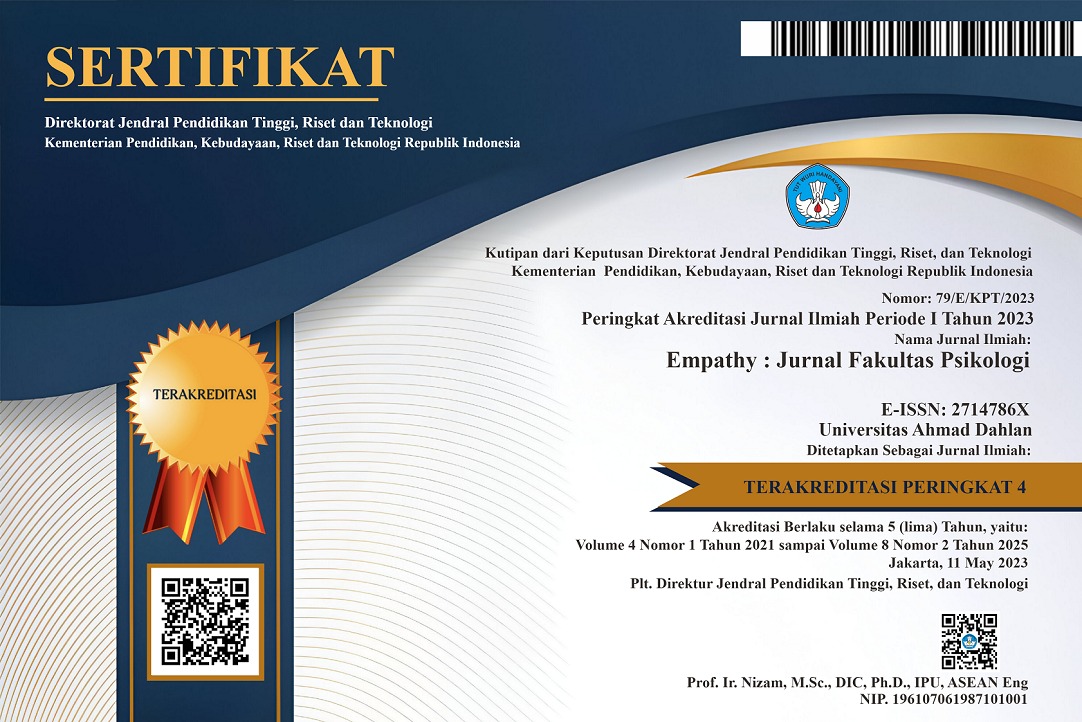Review of item items of the scale of gratitude in the perspective of Islamic Psychology
DOI:
https://doi.org/10.12928/empathy.v5i2.25111Keywords:
Diversity, Islamic PsychologyAbstract
Diversity is an important study and talk in various religions, and the latter in psychology. Gratitude talks in psychology are related to mental health, social psychology, clinical psychology, educational psychology and especially positive psychology. Talk and research on diversity has been going on for more than two decades. in the study of psychology in general. To be grateful is to present to oneself an oral expression in the form of praise to the khalik for all the favors obtained.References
Acocella, J. R. ,& Calhoun, J. F. (1990). Psikologi tentang penyesuaian dan hubungan kemanusiaan (Alih bahasa: Satmoko, R.S). Semarang: IKIP Press
Bhakti, C. P., & Kurniawan, S. J. (2020). Konsep Psikoedukasi Berbasis Blended Learning bagi Remaja di Masa Pandemi Covid-19. Prosiding Seminar Bimbingan dan …, 52–60. http://conference.um.ac.id/index.php/bk2/article/view/80
Emmons, R. A., & McCullough, M. E. (2012). The Psychology of Gratitude. In The Psychology of Gratitude. Oxford University Press. https://doi.org/10.1093/acprof:oso/9780195150100.001.0001
Erford, B. T., Giguere, M., Glenn, K., & Ciarlone, H. (2014). Professional School Counseling (PSC) Publication Pattern Review: A Meta-Study of Author and Article Characteristics from the First 15 Years. Professional School Counseling, 18(1), 2156759X0001800. https://doi.org/10.1177/2156759x0001800107
Eriyanda, D., & Khairani, M. (2018). Kebersyukuran dan kebahagiaan pada wanita yang bercerai di Aceh. Psikodimensia, 16(2), 189. https://doi.org/10.24167/psiko.v16i2.1269
Fitzgerald, P. (1998). Gratitude and justice. Ethics, 109(1), 119–153. https://doi.org/10.1086/233876
Husnawati, H., Tentama, F., & Situmorang, N. Z. (2019). Pengujian validitas dan reliabilitas konstruk hope. Jurnal Psikologi Terapan dan Pendidikan, 1(2), 128. https://doi.org/10.26555/jptp.v1i2.15136
Irsyad, M., Akbar, S. N., & Safitri, J. (2019). Hubungan antara kebersyukuran dengan kesejahteraan subjektif pada remaja di panti asuhan di kota martapura the relationship between gratitude and subjective well-being on adolescent orphanages in martapura city. In Jurnal Kognisia (Vol. 2, Nomor 1). http://ppjp.ulm.ac.id/journals/index.php/kog/article/view/1601
Jang, S. J., Johnson, B. R., Hays, J., Hallett, M., & Duwe, G. (2018). Existential and virtuous effects of religiosity on mental health and aggressiveness among offenders. Religions, 9(6), 1–19. https://doi.org/10.3390/rel9060182
Jang, S. J., Johnson, B. R., Hays, J., Hallett, M., & Duwe, G. (2018). Existential and virtuous effects of religiosity on mental health and aggressiveness among offenders. Religions, 9(6), 1–19. https://doi.org/10.3390/rel9060182
Martos, T., Garay, M., & Désfalvi, J. (2014). Introduction and psychometric properties of the Hungarian version of the gratitude questionnaire (GQ-6-H). Mentalhigiene Es Pszichoszomatika, 15(3), 203–214. https://doi.org/10.1556/Mental.15.2014.3.3
Martos, T., Garay, M., & Désfalvi, J. (2014). Introduction and psychometric properties of the Hungarian version of the gratitude questionnaire (GQ-6-H). Mentalhigiene Es Pszichoszomatika, 15(3), 203–214. https://doi.org/10.1556/Mental.15.2014.3.3
McCullough, M. E., Emmons, R. A., & Tsang, J. A. (2002). The grateful disposition: A conceptual and empirical topography. Journal of Personality and Social Psychology, 82(1), 112–127. https://doi.org/10.1037/0022-3514.82.1.112
McCullough, M. E., Emmons, R. A., & Tsang, J. A. (2002). The grateful disposition: A conceptual and empirical topography. Journal of Personality and Social Psychology, 82(1), 112–127. https://doi.org/10.1037/0022-3514.82.1.112
McCullough, M. E., Emmons, R. A., & Tsang, J. A. (2002). The grateful disposition: A conceptual and empirical topography. Journal of Personality and Social Psychology, 82(1), 112–127. https://doi.org/10.1037/0022-3514.82.1.112
Nurpitasari, E., Aji, B. S., & Kurniawan, S. J. (2018). Pengembangan Kompetensi Teknologi dan Peran Konselor dalam Menghadapi Peserta Didik di Era Disrupsi. Prosiding Seminar Nasional BK, 2(1), 10–14.
Rash, J. A., Matsuba, M. K., & Prkachin, K. M. (2011). Gratitude and well-being: Who benefits the most from a gratitude intervention? Applied Psychology: Health and Well-Being, 3(3), 350–369. https://doi.org/10.1111/j.1758-0854.2011.01058.x
Rash, J. A., Matsuba, M. K., & Prkachin, K. M. (2011). Gratitude and well-being: Who benefits the most from a gratitude intervention? Applied Psychology: Health and Well-Being, 3(3), 350–369. https://doi.org/10.1111/j.1758-0854.2011.01058.x
Savin-Baden, M., & Howell-Major, C. (2013). Qualititative research: the essential guide to theory and practice maggi savin-baden and claire howell-major.
Seuring, S., & Gold, S. (2012). Conducting content-analysis based literature reviews in supply chain management. emerald.com, 17(5), 544–555. https://doi.org/10.1108/13598541211258609
Tehranchi, A., Doost, H. T. N., Amiri, S., & Power, M. J. (2018). The role of character strengths in depression: A structural equation model. Frontiers in Psychology, 9(SEP), 1–11. https://doi.org/10.3389/fpsyg.2018.01609
Tehranchi, A., Doost, H. T. N., Amiri, S., & Power, M. J. (2018). The role of character strengths in depression: A structural equation model. Frontiers in Psychology, 9(SEP), 1–11. https://doi.org/10.3389/fpsyg.2018.01609
Watkins, P. C., Woodward, K., Stone, T., & Kolts, R. L. (2003). Gratitude and happiness: Development of a measure of gratitude, and relationships with subjective well-being. Social Behavior and Personality, 31(5), 431–452. https://doi.org/10.2224/sbp.2003.31.5.431
Downloads
Published
Issue
Section
License
Authors who publish with Empathy: Jurnal Fakultas Psikologi agree to the following terms:
- Authors retain copyright and grant the journal right of first publication with the work simultaneously licensed under a Creative Commons Attribution License (CC BY-SA 4.0) that allows others to share the work with an acknowledgment of the work's authorship and initial publication in this journal.
- Authors are able to enter into separate, additional contractual arrangements for the non-exclusive distribution of the journal's published version of the work (e.g., post it to an institutional repository or publish it in a book), with an acknowledgment of its initial publication in this journal.
- Authors are permitted and encouraged to post their work online (e.g., in institutional repositories or on their website) prior to and during the submission process, as it can lead to productive exchanges, as well as earlier and greater citation of published work.

This work is licensed under a Creative Commons Attribution-ShareAlike 4.0 International License.



